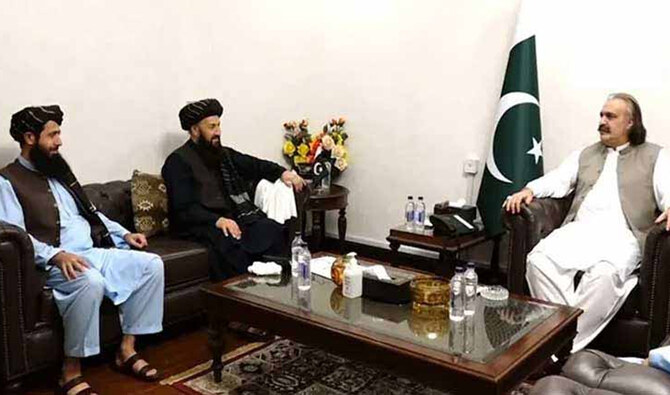PESHAWAR: The government in Pakistan’s northwestern Khyber Pakhtunkhwa (KP) province has decided to send two delegations, comprising tribal elders, religious scholars, and political leaders, to engage in direct talks with the Afghan Taliban rulers for peace and stability in the region, a KP government spokesman said on Sunday, amid a rise in militant attacks in the province that borders Afghanistan.
The development came a day after KP Chief Minister Ali Amin Gandapur said the security situation in the province was directly linked to the “developments in neighboring Afghanistan,” following a consultative meeting convened by the KP administration under the title “National Unity Against Terrorism” that brought together representatives from various religious and political parties.
Pakistan has struggled to contain a surge in militancy in KP since a fragile truce between the Pakistani Taliban, or the Tehreek-e-Taliban Pakistan (TTP), and Islamabad broke down in November 2022. The TTP and other militant groups have frequently targeted security forces convoys and check-posts, besides targeted killings and kidnappings of law enforcers and government officials in recent months.
The engagement with Kabul is planned to address critical issues, including cross-border security, economic cooperation and trade and KP government spokesman Muhammad Ali Saif would be the focal person of the KP government and part of all delegations in this regard, according to a statement issued from the provincial information department.
“There is no timeframe given for the visit of the planned delegations but they will visit very soon,” Nisar Khan, an official at the KP information department, told Arab News on Sunday.
Pakistan’s top military and political leadership has blamed the surge in violence on TTP militants launching cross-border attacks from Afghanistan, accusing Kabul of harboring and facilitating them. Afghanistan denies the allegation and says Pakistan’s security is an internal matter of Islamabad.
The TTP continues to get financial and logistical support from Kabul, a United Nations (UN) report said this month, amid Islamabad’s repeated calls for Afghanistan to rein in the group. The ambition and scale of the TTP’s attacks on Pakistan had significantly increased, with over 600 attacks from July till December 2024, the report said.
The KP provincial government intends to send the first delegation to lay the foundation for meaningful talks and pave the way for the second delegation to reach some sort of tangible solution to issues, according to officials.
Saif said tribal communities residing on both sides of the porous Pakistan-Afghanistan border share the same language, tradition and social norms.
“However, due to prolonged conflict and instability in the region, cross-border relationships have been impacted, contributing to security concerns, economic downturn and humanitarian challenges,” he said in a statement.
Aamer Raza, a lecturer of political science at the University of Peshawar, told Arab News that it would be too early to expect “immediate and tangible results” from the intended talks, but the engagements would help build confidence between the two sides.
“The issue of militancy in the province and in the region is interconnected. Cooperation between the two sides can bring down militancy not only in KP but the same will enhance peace and stability in Afghanistan,” he said.
“Dealing with the complex ideological landscape of militancy in the region will need an intricate dialogue.”
Saif said the objectives of the delegation include strengthening cross-border tribal diplomacy, confidence-building measures between tribal communities and authorities on both sides.
“[The delegations] will try to address cross-border security concerns, engage tribal leaders to dissuade terrorist organizations from using Afghan territory for launching attacks in Pakistan, seek cooperation in monitoring and preventing the TTP and other militant movements across the border,” he said, adding the delegates would also explore opportunities for trade between border regions, initiatives to enhance health care, education and livelihood opportunities.
Saif said his government intended to explore ways to establish mechanisms for the movement of people of both countries for medical treatment and business, and strengthening cultural and social exchanges.
The first delegation, comprising tribal elders and a senior government official from KP, would establish diplomatic groundwork and coordinate with Afghan counterparts, according to the KP government spokesman.
“Liaison with the federal government will be ensured for approvals and guidance,” he added.
After the first visit, a larger delegation, comprising tribal elders, religious scholars and key stakeholders, would visit Afghanistan to engage with Afghan tribal leaders and government representatives.
“Discussion points will cover security, trade, refugee issues and cross-border collaboration,” he added.
Irfanullah Khan, a Pakistani scholar and expert on tribal affairs, called the KP government initiative a “positive step toward addressing security issues,” but said the likelihood of achieving durable peace depends on the capacity of Afghan authorities to enforce agreements as well as the level of cooperation from Pakistan in addressing local grievances.
“Bilateral engagement is a good gesture which will lay the groundwork for peace, but sustained efforts are needed from both Kabul and Islamabad to address security issues,” he said.
“It is a good move to include tribal leaders in the talks. Local populations must feel empowered in the decision-making process. Combination of security measures, development activities and good governance can contribute gradually to restoration of peace in KP and its tribal areas.”
Irfanullah, however, said the success of negotiations would depend on the evolving political and security landscape.
Saif said the KP government would formally notify the federal government about the initiative, ensuring its alignment with national foreign and security policies.
“No commitments will be made that override Pakistan’s national security framework or diplomatic stance,” he added.
Northwestern Pakistani province to send delegations to Kabul for talks amid surge in militancy
https://arab.news/j7t7x
Northwestern Pakistani province to send delegations to Kabul for talks amid surge in militancy

- Pakistan has struggled to contain a surge in militancy since a fragile truce between Pakistani Taliban and Islamabad broke down in 2022
- Islamabad has frequently accused Afghanistan of sheltering militant groups that launch cross-border attacks, Kabul denies the allegation
Pakistan, UAE agree to boost cooperation in higher education, human resources

- The UAE is home to over 1.5 million Pakistanis who send more than $5 billion in remittances annually
- Both countries resolve to work on initiatives to benefit students, academic institutions and professionals
ISLAMABAD: Pakistan and the United Arab Emirates (UAE) have agreed to strengthen bilateral cooperation in higher education and human resource development, the Pakistani embassy said on Saturday.
The statement came after a meeting between Pakistan’s Ambassador Faisal Niaz Tirmizi and Dr. Abdulrahman bin Abdulmanan Al-Awar, the UAE minister of human resources, higher education and scientific research.
The UAE is home to more than 1.5 million Pakistani expatriates who live and work in the Gulf country and send back more than $5 billion in remittances to the South Asian country annually.
During the meeting, Ambassador Tirmizi highlighted the contributions of the Pakistani community to the UAE’s development and appreciated the Gulf country for fostering an inclusive and enabling environment for expatriates.
“Both sides reviewed ongoing collaboration and explored avenues to further enhance bilateral cooperation in the fields of higher education and human resource development,” the Pakistani embassy said.
“The discussions reflected a shared resolve to work closely on initiatives that benefit students, academic institutions, and professionals from both countries.”
Ambassador Tirmizi reiterated Pakistan’s commitment to strengthening institutional linkages and advancing cooperation in skill development and workforce preparedness.
“Minister Dr. Abdulrahman Al-Awar lauded the longstanding and brotherly relations between the two countries and expressed the UAE’s keen interest in expanding its partnership with Pakistan in mutually beneficial areas,” the Pakistani embassy said.
“He welcomed sustained dialogue and coordination between the relevant authorities of both nations.”
Eight militants killed in separate operations in Pakistan’s Punjab, Khyber Pakhtunkhwa

- The operations were conducted in Lakki Marwat and near Taunsa Sharif on the reported presence of militants
- Pakistan has witnessed a sharp rise in militancy in its western regions bordering Afghanistan in recent months
KARACHI: At least eight militants were killed in two separate operations in Pakistan’s Punjab and Khyber Pakhtunkhwa (KP) provinces, authorities said on Saturday.
In the first incident, officials of the KP counter-terrorism department (CTD) and police conducted a raid in the Lakki Marwat district which resulted in an encounter with militants.
The shootout left three members of the Pakistani Taliban’s Tipu Gul group dead, whereas officials seized three Kalashnikovs and hundreds of rounds from the site, according to a CTD statement.
“These militants were actively engaged in targeted killings and direct assaults against law enforcement personnel, including multiple CTD and district police officials,” the statement read.
In another operation in Punjab, CTD and police personnel gunned down five Pakistani Taliban militants near Taunsa Sharif district, the interior ministry, adding referring to them as “Indian-sponsored terrorists.”
“Punjab police and the CTD thwarted the nefarious motives of Khawarij [Pakistani Taliban] terrorists,” Interior Minister Mohsin Naqvi was quoted as saying. “We will continue to chase the terrorists of Fitna Al-Hindustan everywhere.”
Pakistan has witnessed a sharp rise in violence in its western regions bordering Afghanistan.
On Friday, the Pakistani military said security forces had killed at least 30 “Indian-sponsored” militants while attempting to cross into Pakistan through its border with Afghanistan this week.
Islamabad accuses India of backing militant groups and Afghanistan of allowing the use of its soil for attacks against Pakistan. Kabul and New Delhi deny the allegation.
As Karachi heats up, class and access divide city into a ‘climate apartheid’

- Pakistan’s largest city exposes a stark class divide in access to electricity and cooling as temperatures soar
- In some neighborhoods, electricity lasts two hours a day while the wealthy stay cool with air-conditioning, solar backup
KARACHI: When the sun rises over the portside slums of Keamari in the Pakistani megacity of Karachi, 48-year-old mason Fazal Rahim steps out with his rusted tools into the searing heat.
By the time he returns home at night, drenched in sweat, there’s often no electricity to power even a single fan.
“It’s still unbearably hot and there’s no electricity either,” Rahim told Arab News.
“Our home turns into a hell, the children cry and heat rashes break out on their skin.”
As Pakistan’s largest city sweltered through a record-breaking heatwave in June, temperatures soared past 42 degrees Celsius (over 107°F), exposing a harsh urban reality: while the wealthy kept cool in air-conditioned homes, the poor suffered hours of unrelenting heat in overcrowded neighborhoods plunged into darkness by extended power outages.
Karachi’s two-tiered climate reality, shaped by class and access, now resembles what human rights advocates describe as “climate apartheid,” a term that captures how climate change disproportionately affects marginalized populations while the wealthy remain buffered.
Hospitals across the city, including the government-run Jinnah Postgraduate Medical Center (JPMC), saw a spike in heat-related illnesses.
“We had nearly a thousand patients last year who came in with heatstroke,” said Dr. Irfan Siddiqui, head of JPMC’s emergency department, citing a rise in cases of dehydration, food poisoning and heat exhaustion this year.
POWER DIVIDE
More than 90 percent of Pakistan’s international trade flows through Karachi, a city of over 20 million people and the country’s economic engine. But despite its centrality to Pakistan’s economy, the city’s basic infrastructure, especially in its low-income neighborhoods, is chronically neglected.
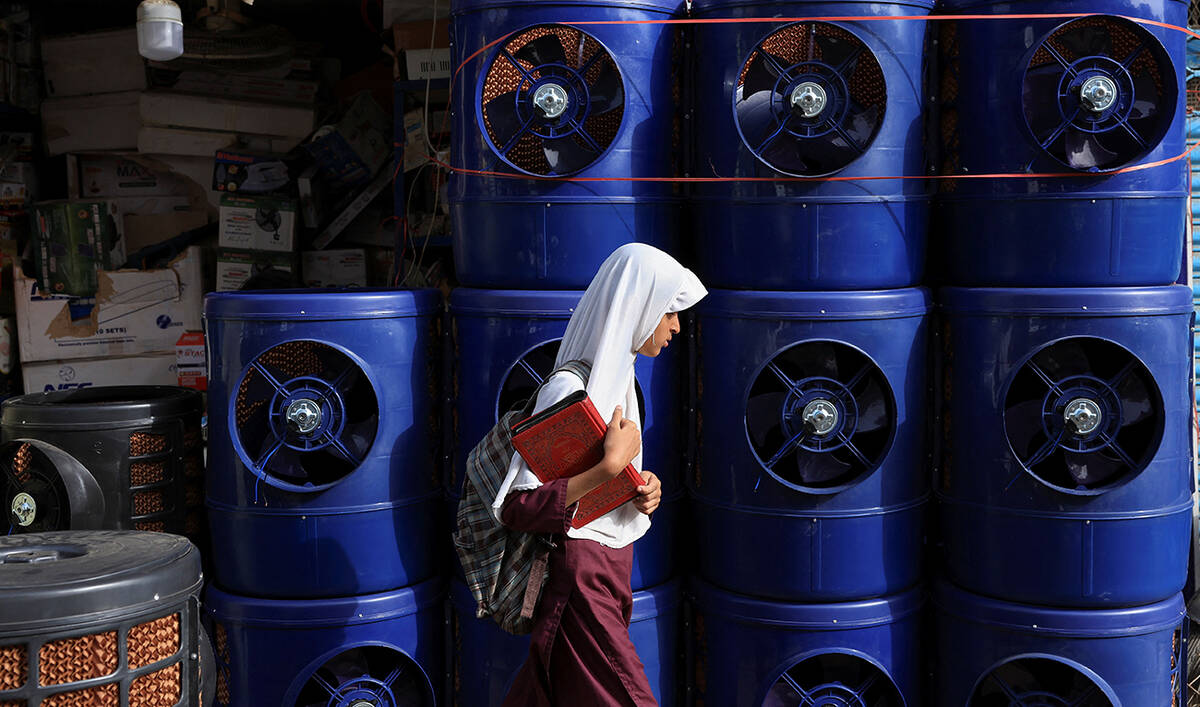
Some residents, like Rahim in Bhutta Village, reported only two hours of electricity in a full day last month. In stark contrast, affluent areas such as Clifton and Defense Housing Authority (DHA) remained largely unaffected by power outages, with many homes powered by private solar panels or diesel generators.
K-Electric, the city’s sole power distributor, insists the disparity is not based on class.
“The load-shedding schedule is purely determined on a commercial basis,” said Bilal Memon, a spokesperson for the utility. “Areas with higher theft and lower bill recovery face longer outages.”
Pakistan’s National Electric Power Regulatory Authority (NEPRA) confirmed in its latest State of Industry Report (2023) that Karachi faces some of the highest transmission and distribution losses among major cities — a result of illegal connections, aging infrastructure, and weak governance. The report also noted that high-loss areas tend to face longer outages as a penalty mechanism.
For those already on the margins, like Tahira Perveen, a widowed asthma patient residing in the low-income Manzoor colony, the unpredictability of the electricity supply can be dangerous.
“As for electricity, no one knows when it will come,” she said. “During the heat, it [the outage] happens all night and all day.”
A CITY GETTING HOTTER
Karachi is among the world’s ten fastest-warming megacities, according to urban climate assessments by the United Nations Environment Program. The city has warmed at nearly double Pakistan’s national average, with temperatures rising by approximately 0.34°C per decade since 1960, according to Sardar Sarfaraz, the former director of the Pakistan Meteorological Department.
The causes are well documented: unchecked urbanization, the destruction of green spaces, and widespread use of concrete that traps heat. Karachi lost over 20 percent of its tree cover between 2008 and 2019, according to satellite data analyzed by the Global Forest Watch platform.
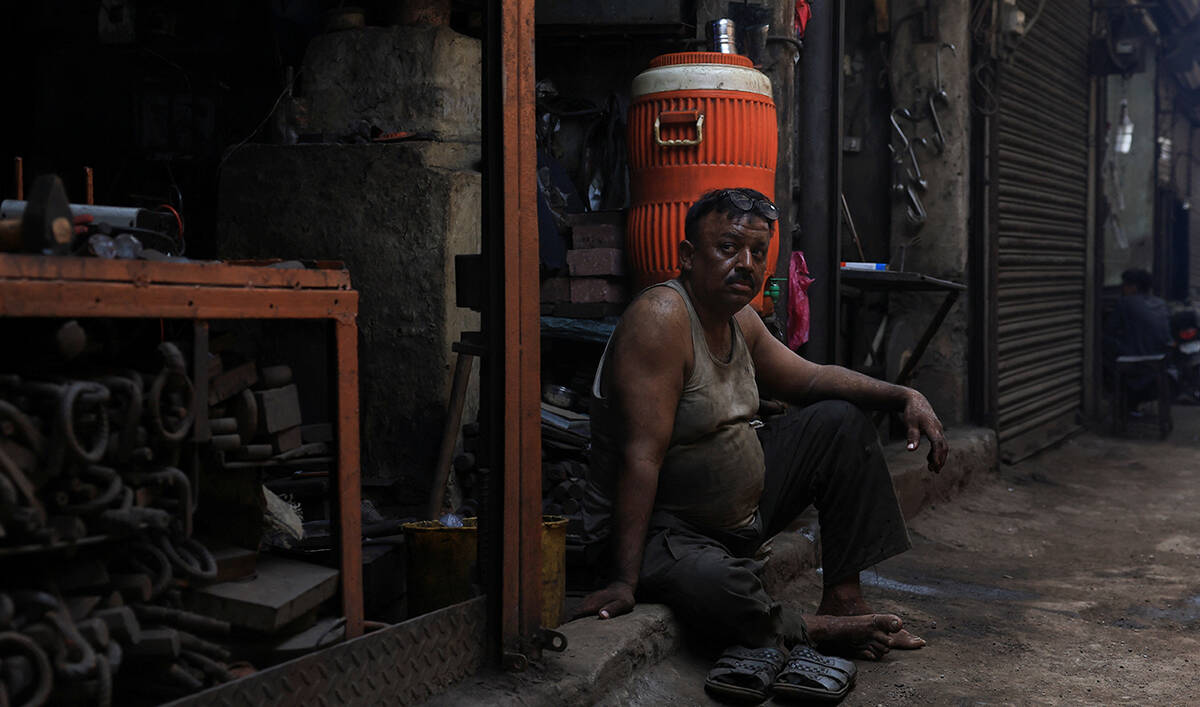
“There are narrow lanes, very, very poorly ventilated houses, and it’s all a concrete jungle,” said Karachi-based climate expert Afia Salam.
“There is a segment, large segment of population, which is more impacted than the others. And then on top of it, if I put the gender lens on, the women are more impacted because culturally, they do not have access to the open spaces.”
Indeed, in the city’s informal settlements, women and children are often confined indoors, where poor ventilation and a lack of cooling options increase health risks during heatwaves.
CLIMATE INEQUALITY
Pakistan is ranked among the top ten countries most vulnerable to climate change, according to the Global Climate Risk Index by Germanwatch. Nearly 45 percent of its population lives below the poverty line, per the World Bank, and the country faces mounting challenges in coping with environmental shocks — from floods and droughts to rising temperatures.
In 2024, the International Monetary Fund approved $1.3 billion in climate-linked funding for Pakistan to support adaptation and resilience efforts. But activists say little climate funding is reaching those most in need.
“The policies being made don’t reflect the ground realities,” said Fatima Majeed, an activist working with coastal communities affected by rising sea levels and heat. “The people for whom these policies are intended are rarely consulted.”
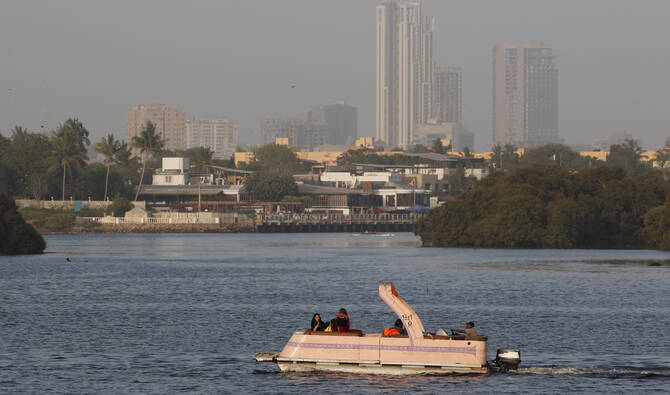
Her concerns were echoed by Yasir Husain, founder of the Karachi-based Climate Action Center.
“We find that the government is least interested in this,” he said. “When there are programs, there is funding. [But] that money is not used to help the vulnerable populations.”
Sindh’s Environment and Climate Change Secretary, Agha Shahnawaz Khan, pointed to ongoing efforts: penalizing smoke-emitting vehicles, tree plantation drives, mangrove restoration and solarizing public buildings.
“We will continue to lag behind until the community supports the government and the government takes proper initiatives,” he said.
COOLING FOR A FEW
Twelve kilometers from Rahim’s baking slum, Dr. Navaira Ali Bangash lives in comfort, her home equipped with air conditioners and backup power systems.
“We are probably the most privileged people who have air-conditioning installed at our homes, offices and even in our cars,” she said. “But then there are those underprivileged people... who cannot even afford basic fans.”
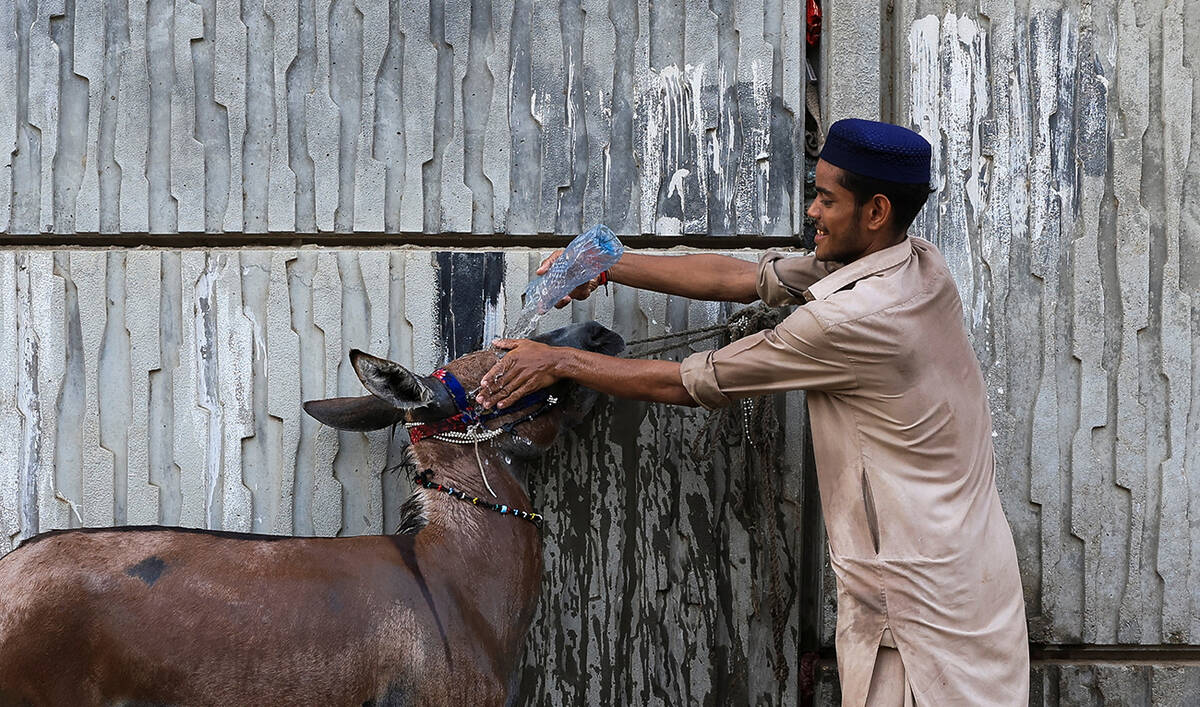
While climate change is often described as a global challenge, in Karachi it is deeply local — a force that exposes long-standing inequalities in housing, infrastructure, and health care.
For Rahim, the national climate discourse and international funding commitments matter little. His immediate concern is whether the ceiling fan in his single-room home will run tonight.
“Electricity [outages] have made our lives miserable,” he said, his voice tired and defeated in the oppressive heat.
Microsoft shifting to partner-led delivery model, not retreating from Pakistan — IT ministry

- The statement follows reports about the closure of Microsoft’s office and lay-off of its employees in Pakistan
- Islamabad to engage with tech giant to ensure any structural changes strengthen its commitment to local customers
ISLAMABAD: Pakistan’s information technology (IT) ministry said on Saturday that global tech giant Microsoft was not retreating from the Pakistani market and was only moving to a partner-led, cloud-based delivery model in the South Asian country.
The statement followed media reports about the closure of Microsoft’s office and lay-off of a small number of employees in Pakistan, sparked by a LinkedIn post by a former head of Microsoft in the country.
The Pakistani IT ministry said the tech giant had shifted its licensing and commercial-contract management for Pakistan to its European hub in Ireland in recent years, while its day-to-day service delivery had been handled entirely by certified local partners.
“Against that backdrop, we understand Microsoft is now reviewing the future of its liaison office in Pakistan as part of a wider workforce-optimization program,” the IT ministry said in a statement.
“This would reflect a long-signalled strategy, consolidating direct headcount and moving toward a partner-led, cloud-based delivery model, rather than a retreat from the Pakistani market.”
Pakistan’s IT sector has witnessed a significant growth in recent years, reaching $3.4 million from July 2024 till May 2025, compared to $2.9 million during the same period the previous year, according to the Pakistani central bank.
Prime Minister Shehbaz Sharif’s government has been striving to further increase these exports to support the $350 billion economy, and the IT ministry sought to allay concerns about the clousure of the Microsoft office.
It said the global pivot from on-premise software (transactional deals) to Software-as-a-Service (SaaS) continues to reshape how technology firms structure their international operations, and Microsoft is no exception.
“Pakistan’s Ministry of IT & Telecom recognizes the strategic value of having leading global technology providers active in the country,” the ministry said.
“We will continue to engage Microsoft’s regional and global leadership to ensure that any structural changes strengthen, rather than diminish, Microsoft’s long term commitment to Pakistani customers, developers and channel partners.”
Trump says tariff letters to 12 countries signed, going out Monday

- Trump in April announced a 10% base tariff rate and additional amounts for most countries, some ranging as high as 50%
- All but the 10% base rate were subsequently suspended for 90 days to allow more time for negotiations to secure deals
NEW JERSEY: US President Donald Trump said he had signed letters to 12 countries outlining the various tariff levels they would face on goods they export to the United States, with the "take it or leave it" offers to be sent out on Monday.
Trump, speaking to reporters aboard Air Force One as he traveled to New Jersey, declined to name the countries involved, saying that would be made public on Monday.
Trump had earlier on Thursday told reporters that he expected a first batch of letters to go out on Friday, a national holiday in the United States, though the date has now shifted.
In a global trade war that has upended financial markets and set off a scramble among policymakers to guard their economies, Trump in April announced a 10% base tariff rate and additional amounts for most countries, some ranging as high as 50%.
However, all but the 10% base rate were subsequently suspended for 90 days to allow more time for negotiations to secure deals.
That period ends on July 9, although Trump early on Friday said the tariffs could be even higher - ranging up to 70% - with most set to go into effect August 1.
"I signed some letters and they'll go out on Monday, probably twelve," Trump said, when asked about his plans on the tariff front. "Different amounts of money, different amounts of tariffs."
Trump and his top aides initially said they would launch negotiations with scores of countries on tariff rates, but the US president has soured on that process after repeated setbacks with major trading partners, including Japan and the European Union.
He touched on that briefly late on Friday, telling reporters: "The letters are better ... much easier to send a letter."
He did not address his prediction that some broader trade agreements could be reached before the July 9 deadline.
The shift in the White House's strategy reflects the challenges of completing trade agreements on everything from tariffs to non-tariff barriers such as bans on agricultural imports, and especially on an accelerated timeline.
Most past trade agreements have taken years of negotiations to complete.
The only trade agreements reached to date are with Britain, which reached a deal in May to keep a 10% rate and won preferential treatment for some sectors including autos and aircraft engines, and with Vietnam, cutting tariffs on many Vietnamese goods to 20% from his previously threatened 46%. Many US products would be allowed to enter Vietnam duty free.
A deal expected with India has failed to materialize, and EU diplomats on Friday said they have failed to achieve a breakthrough in trade negotiations with the Trump administration, and may now seek to extend the status quo to avoid tariff hikes.


